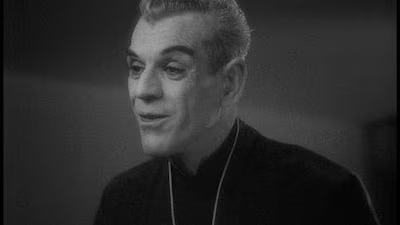David Manners

About
Biography
Filmography
Family & Companions
Bibliography
Notes
As an in-joke, a character in the 1986 horror film "The Tomb" was named David Manners.
"Always well-dressed, well-spoken, and with impeccable manners, David was a perfect leading man for aspiring young actresses and older female stars who wanted nobody stealing scenes from them with mannerisms or too much sex appeal. . . He was what girls in those days called 'a good catch,' playing an earnest, sincere young man with the kind of good looks that needn't worry parents unduly."--Richard Lamparski in "Whatever Became Of...?" vol. 1 (1967)
Biography
This slim, handsome boyish juvenile of the 1930s provided able support for such leading ladies as Loretta Young, Katharine Hepburn, Barbara Stanwyck and Constance Bennett. The Canadian-born Manners studied at the Theater Guild in New York in the late 1920s, and was drafted by Tiffany Productions in 1930 to make his film debut in the screen version of the bitter WWI drama "Journey's End." Directed by James Whale and starring Colin Clive (who had played in the stage version), it was a fortuitous debut. Manners made quite an impression as the idealistic young lieutenant who is forced to take his men out on a suicidal raid and is himself mortally wounded. His death scene was generally acclaimed to be a high point of the film.
Sadly, few of the actor's follow-up films called upon his talents to that extent. Hollywood saw him as an unthreatening "boyfriend" type and he was cast in a series of drawing-room melodramas and light comedies with various studios. Most of his films did fairly well at the box office, then promptly vanished from the public consciousness. Among the more notable were "The Right to Love" (1930), opposite Ruth Chatterton, "The Truth About Youth" (1930) with Loretta Young, "Crooner" (1932), "From Hell to Heaven" (1933), co-starring Carole Lombard, and "Hearts in Bondage" (1936).
Manners was also cast in a series of successful horror films which today remain his chief legacy. He played innocent, stalwart young victims in such classics as "Dracula" (1931, as Jonathan Harker), "The Death Kiss" (1932), "The Mummy" (1932), "The Black Cat" (1934, with both Boris Karloff and Bela Lugosi), and the atmospheric Dickens' tale "The Mystery of Edwin Drood" (1935). Manners also did his best in mostly unrewarding supporting roles in other superior films, as well. He was Barbara Stanwyck's idealistic admirer in Frank Capra's "The Miracle Woman" (1931) and Katharine Hepburn's fiance in her debut, "A Bill of Divorcement" (1932). He played colorless male ingenues in the gold-digger comedy "The Greeks Had a Word for Them" (1932), the Eddie Cantor musical "Roman Scandals" (1933) and the absurdist comedy "The Warrior's Husband" (also 1933). By 1936, Manners was getting increasingly disenchanted with his roles and, after supporting Hepburn again in the period drama "A Woman Rebels," he retired from films.
Little more was heard from the reclusive Manners until he attempted a Broadway show, "Truckline Cafe" (with a young Marlon Brando) in 1946. Beginning in the 1950s, he commenced a successful second career as a novelist. The former actor always politely refused to discuss his slightly disappointing film career in later years.
Filmography
Cast (Feature Film)
Cast (Special)
Cast (Short)
Life Events
1924
Stage acting debut in "Hippolytus" at the Hart House Theater in Toronto
1930
Made film debut in "Journey's End"
1931
Had most prominent role as John Harker in "Dracula", starring Bela Lugosi
1932
Co-starred in "The Mummy" with Boris Karloff
1932
Appeared opposite Katharine Hepburn in "A Bill of Divorcement"
1934
Acted with Karloff and Lugosi in Edgar G Ullmer's "Black Cat"
1935
Had title role in "The Mystery of Edwin Drood"
1936
Last film, "A Woman Rebels"
1946
Starred in Broadway play "Truckline Cafe"
Photo Collections
Videos
Movie Clip












Trailer








Family
Companions

Bibliography
Notes
As an in-joke, a character in the 1986 horror film "The Tomb" was named David Manners.
"Always well-dressed, well-spoken, and with impeccable manners, David was a perfect leading man for aspiring young actresses and older female stars who wanted nobody stealing scenes from them with mannerisms or too much sex appeal. . . He was what girls in those days called 'a good catch,' playing an earnest, sincere young man with the kind of good looks that needn't worry parents unduly."--Richard Lamparski in "Whatever Became Of...?" vol. 1 (1967)











